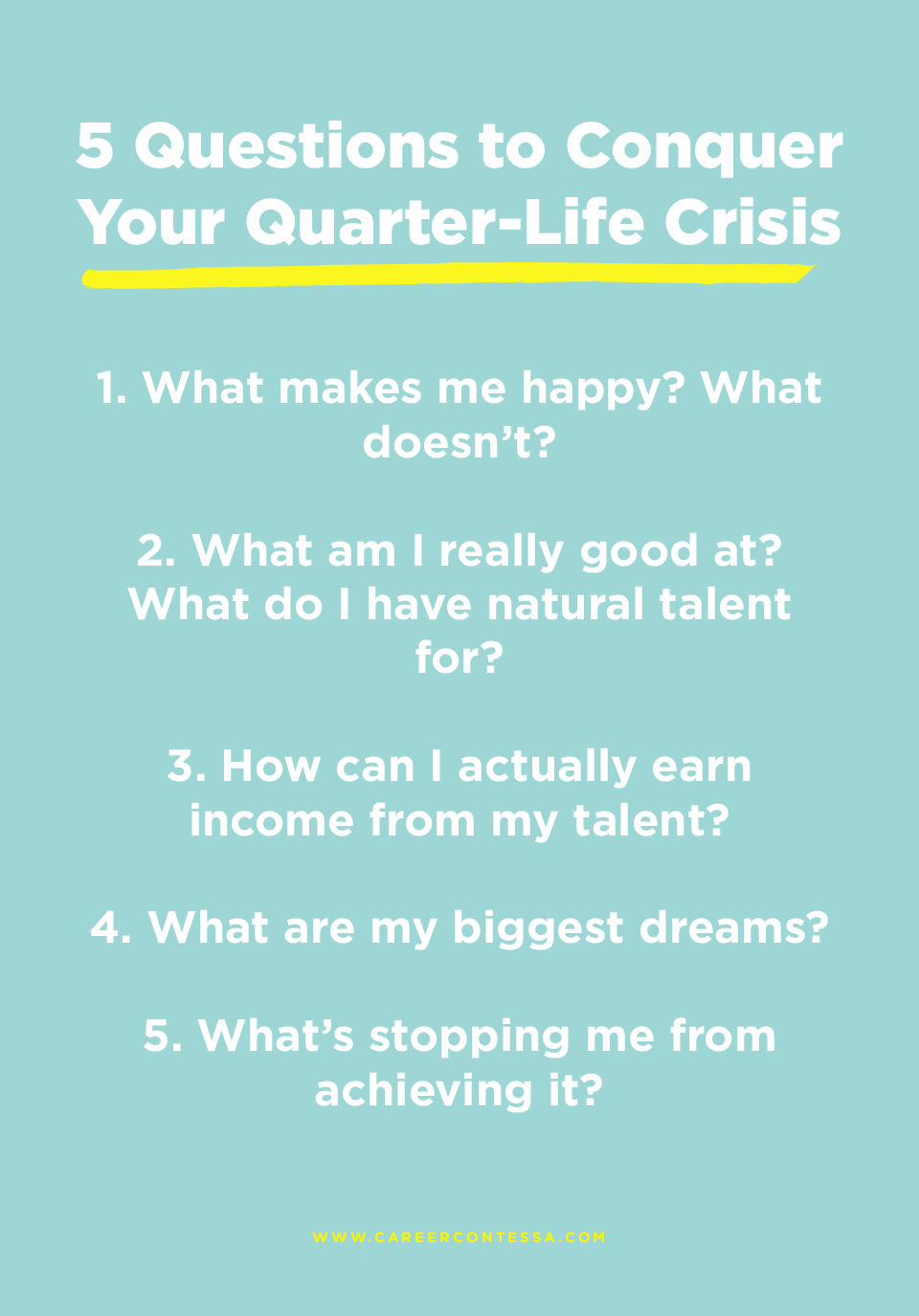When I turned 25, I experienced what has now been coined the "
quarter-life crisis."
I had spent the majority of my life so far feeling too young. I was too young to get that job. I was too young to understand my industry. Heck, I had just become "old enough" to rent a car. All of a sudden, I was confronted with a terrifying thought: Was I about to become too old?
These feelings of anxiety are common in many young adults on the verge of leaving their 20s behind. Suddenly, the glory days of high school seemed far away.
In the late-night glow of social media, I saw everyone in my social groups doing the things I hadn't yet achieved.
I felt pure panic. Have I already fallen behind on the life events I am "supposed" to be experiencing? Have I made the most of workplace relationships to move my career planning forward? Can my professional life catch up?
Just like that, I was bracing myself for a serious period of uncertainty as my early 30s inched closer and closer.
I wish I had been able to tell myself that these feelings of depression, panic, and existential crisis were perfectly normal.
As American Counseling Association (ACA) member
Cyrus Williams told
Counseling Today, “We really need to acknowledge and not minimize this time period.”
What Is a Quarter-Life Crisis?
In popular psychology, a quarter-life crisis is an overarching feeling of anxiety over one's life so far—and the direction one should be heading in both the short-term and long-term.
Also known as Abstract Quarter-life Crisis (QLC), it describes developmental crisis episodes that occur during early adulthood (from about age 18 to 30). In a world where a pandemic is sandwiched between a few
recessions, it should come as no surprise that young adults feel panicked.
A
study from Frontiers examined the common stressors and moments of crises for folks between ages 18 and 30.
Analyzing over 1.5 million tweets and social media data from users in the United States and the United Kingdom, researchers created word clouds detailing language features associated with this time of instability for young adults.
Researchers found these to be the most commonly used words in relation to anxieties:
- work
- trying
- time
- change
- overwhelmed
- weekend
- stuck
- home
- getting there
- next
- coping
- fail
- debt
Sense a common theme here? It's tough to navigate a quarter-life crisis, especially when everyone tells you that this is a great time of life. It's tough to explore this challenging time when the topic of discussion is often ridiculed, lessened, or brushed off entirely.
Your 20s can be a magical time, but that doesn't mean that young adults don't struggle during this time. I've been told to brace for skin damage, less shiny hair, and fatigue that you can't even imagine in your twenties.
I want to provide space for the phenomenon of the quarter-life crisis. This can be a really tough time period of uncertainty, loneliness, and tension with your friends.
7 Signs You're Experiencing a Quarter-Life Career Crisis
Before going into the five questions that help to get out of feelings of a quarter-life crisis, I want to highlight some common signs of a crisis, especially as it related to your career path.
If any or all of these apply to you, it's fine. You're here for a reason and we're going to work through this!
1. You're in a Dead-End Job and You Know It
Your starter job suddenly feels like it isn't a good fit anymore. While it provides stability and a dependable paycheck, you're no longer feeling challenged.
2. You Want to Change Anything + Everything
When you're experiencing a crisis, you might feel the urge to purge. This could mean sabotaging friendships, dissing romantic partners, or dreaming of moving to a new city.
This is an important sign to look out for, especially if you find yourself attempting self-sabotage in every part of your life. It's true that you will outgrow some friendships during this time. In that case, looking to form new friendships is healthy. However, know the difference between growth and self-destruction.
3. Everyone Else Seems to Be Doing Better
We all know that social media is the highlight reel of everyone's best moments. However, the frustrations that come directly from social media are real. Try to ignore them.
4. You Feel Isolated
If you're feeling like nobody "gets" you or how you're feeling, it can be incredibly isolating. Beyond that, a longer period of isolation can cause you to lean heavily on damaging
comparison trap cycles.
5. You're Trying New Activities
Yes, this is actually a good sign! If you're trying to expand your universe by
learning new skills, trying out a
side hustle, or keeping busy with new things, this is a sign you're ready for a change.
6. You Feel Overwhelming Regret
If you're feeling like you wasted the so-called "best years of your life," it's likely that you're feeling the crush of crisis. If you look back, you might feel like you missed out on career opportunities or that you're falling behind because you prioritized your social life.
7. Your Mental Health Is Suffering
If your mental health is suffering, you might be experiencing the onslaught of a crisis. Anyone who has health with mental health issues in the past knows not to ignore increased feelings of
anxiety or depression.
This final sign is what leads up directly into the next section, where I'll share the questions I explored to cut the stigma and look into some career counseling to pull me out of this crisis time.
5 Questions That Will Get You Out of a Career Slump (and Quarter-Life Crisis)
1. What Makes Me Happy? What Doesn't?
People, places, things.
I made lists and described why and how they made me happy, and why I was so blessed to have them in my life. The expressions of
gratitude were extremely beneficial and important to my progress—I realized I was in a much better position than I realized.
Me? Lucky? Eye opener. Likewise, I questioned why I did the things in my life that were not contributing to my happiness and well-being, and removed them immediately.
2. What Am I Really Good At? What Do I Have Natural Talent For?
I'm really great at lots of things—I eat pizza like a champ. Will that make my dreams come true? Highly unlikely.
However, I love to help people, enjoy writing and storytelling, and oh yeah, I have experience in marketing. What are you good at? What do you like to do as a hobby? Have you ever considered trying it as a vocation, or can skills from another venture help you grow in your current role?
3. How Can I Actually Earn Income from My Talent?
See above and connect the dots.
Freelance work is becoming more and more in demand, and there are
tons of ways you can market your skills to make some side cash—maybe eventually turning it into your full-time job. Pro bono work is also an excellent way to gain additional experience until you're comfortable asking for what you're worth—and can help you earn recommendations in the meantime.
4. What Are My Biggest Dream(s)?
No boundaries.
Have you ever dreamed about winning the lottery, and exactly what you'd do with the 20—no—50 million dollar prize? Use the same approach with your personal and
professional goals.
The catch? With
effort and motivation, this one can actually come true. The key is to pick your biggest goal and put an action plan into place to make it happen.
5. What's Stopping Me From Achieving It?
This step requires a lot of ownership. You will have to face any fears you might have about failing and recognize that it takes a lot of accountability. Any goal, no matter how large and looming, can be divided into smaller, doable tasks that set you on the path to achieving success.
How These Questions Actually Help you
These questions were my road map for digging myself out of the dark and dreary slump I had fallen into during my mid-career crisis.
The questions were relatively simple, and sometimes that's the funny thing about these slumps or perceived setbacks. Sometimes life is just waiting for us to open our eyes and realize things for ourselves—we just need to use our common sense.
Focusing on myself and taking the time to consider what I really wanted caused me to take the positive actions needed to change my life.
I quit a
toxic job that was making me miserable, enrolled in classes to
continue my education, began volunteering, and most of all, found
a new job that I absolutely love—and I'm nowhere near finished. I set new
goals regularly and have no intention of slowing down.
Needless to say, I'm expecting (hoping) to be better prepared for when 45 rolls around.
Not everyone fits into a perfectly square box. In fact, some of the most interesting people don't. Don't worry if you don't fit the "norm," be it your age or your career path. Focus on what makes you truly happy—and work backward to forge your path to fulfillment.











